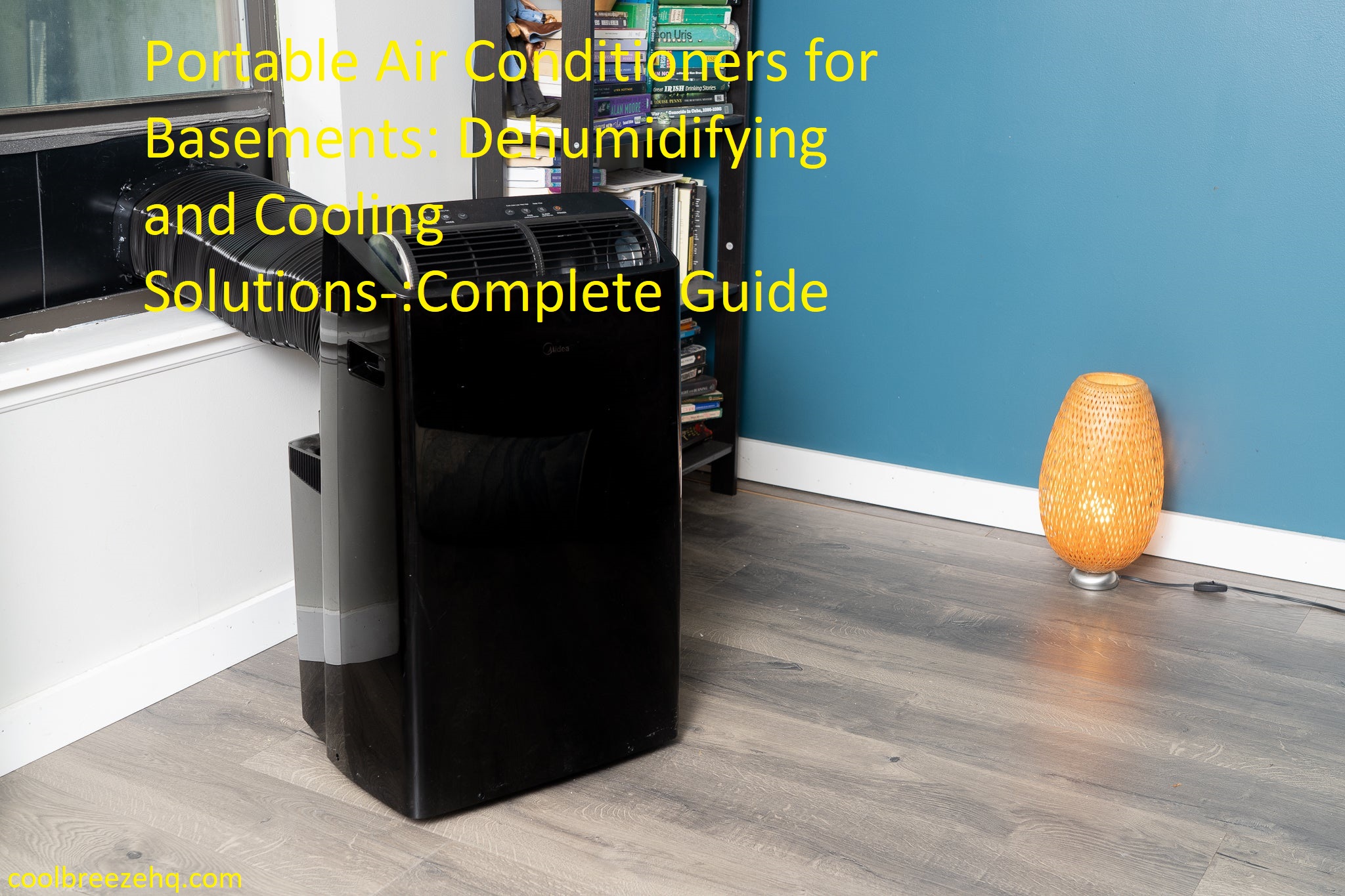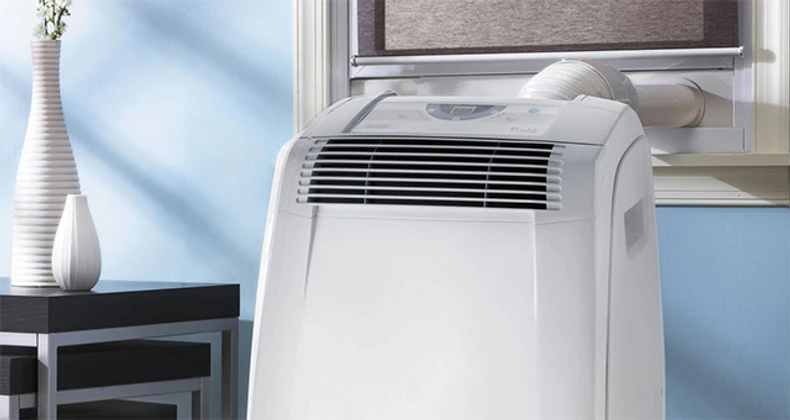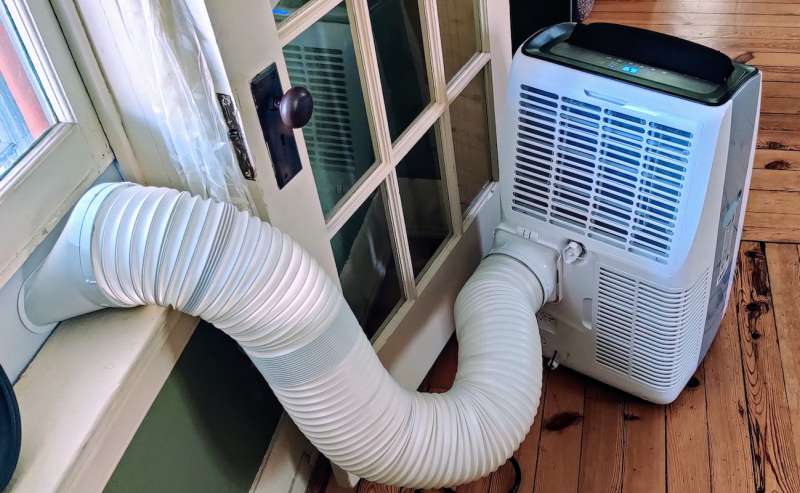Is your basement unbearable during the summer months? You’re not alone!
Portable air conditioners can provide you with much-needed relief from hot and humid temperatures. In this article, you’ll learn all about portable air conditioners-including their dehumidifying and cooling abilities-and how to find the perfect one for your basement.
People often turn to portable air conditioners for basements as an easy and cost-effective way to dehumidify and cool a hot, humid space. Portable air conditioners offer many advantages for basement use, such as being able to move the unit between rooms and using less energy than many other cooling systems. However, there are some important considerations to make before buying a portable unit for your basement.
This guide provides detailed information about how portable air conditioning works, the types of models available on the market today, how to choose the best one for your needs, how to set up the unit in your basement, and maintenance tips that will ensure its longevity. Whether you’re looking to purchase a small window-mounted unit or larger free-standing one, this guide will help you make an informed decision that meets all of your cooling needs in an efficient and economical manner.
Factors to consider before purchasing a portable air conditioner
When it comes to shopping for a portable air conditioner for your basement, there are several factors to consider. The primary objectives of purchasing a portable unit should be both dehumidifying and cooling the room. So, you’ll want to look for units that offer variable fan settings as well as adjustable temperature settings. Additionally, it is important to look at the airflow capacity of the unit in order to determine how much cooling it can provide for your basement.
Other factors you should take into consideration include noise level, power consumption, installation requirements and size. This is especially important if you have limited space in your basement. Additionally, make sure to check the warranty period of the unit before making a final decision. Lastly, be sure that any model you are considering has been tested and certified by an accredited facility such as Underwriters Laboratories (UL). This will ensure that your purchase meets safety standards and will function properly in its intended purpose.
Room size and cooling capacity
When looking for the right portable air conditioner for your basement, it is important to consider not only the size of the room you plan to cool, but also the cooling capacity you will need. Generally speaking, an air conditioner should be able to provide between 20 and 30 British thermal units (BTUs) per square foot of space. For example, a 400-square-foot basement would require a cooling capacity of at least 8,000 BTU’s.
Estimating cooling capacity for a given space can be complicated and involves more than just measuring its square footage. Factors such as how well insulated or sealed it is from outside heat, direct sunlight through windows or skylights as well as heat generated from lights and appliances can all affect how much cooling is needed. It is best to consult with an expert before making a final decision on which size unit you need for your basement – especially if your basement has unique challenges such as high humidity or excessive hot spots in certain areas.
Energy efficiency and power consumption
Before purchasing a portable air conditioner, it is important to consider the energy efficiency and power consumption. This will have a direct impact on both the cost of operation and cooling capacity of the unit. Portable air conditioners range from 10,000 to 20,000 BTU (British Thermal Units). The higher the number, the more powerful the unit is likely to be. Portable air conditioners with a higher BTU typically have higher energy-efficiency ratings and lower power consumption. For example, a 14,000 BTU portable air conditioner has an average power consumption of 1.5 kW – 2 kW when running at maximum performance level.
In addition to the BTU rating, other factors that can affect energy efficiency and power consumption include insulation, shading from direct sunlight or trees and temperature settings. The use of intelligent temperature control systems for precise control of cooling temperatures can further help save energy costs. Look for Energy Star certified air conditioning units for peace-of-mind on these critical criteria when shopping for a new model.
Noise level and convenience features
In addition to power output, it’s important to consider noise level and convenience features when shopping for a portable air conditioner for your basement. Depending on your budget, you could invest in a device that boasts silent operations or select one with noise-reducing technology. Pro-grade models may feature a full suite of advanced cooling precision operations and offer easy installation.
For added convenience, many models now come with remote control capabilities and built-in timers so you can set them up in advance. Ideally, the model you select should be compatible with both double-hung and casement windows as well as other window types like slider windows and jalousie/awning windows. Other features to look out for include an adjustable temperature setting range, precise temperature control accuracy, energy efficiency ratings, self evaporating systems, louvered side panels to pressurize the room properly and more.
Dehumidifying capability and air filtration system
When selecting a portable air conditioner for your basement, look for more than just cooling capabilities. Basements are typically more humid environments, so a dehumidifier is an invaluable addition to your AC unit and will help control relative humidity levels and reduce stagnation.
Air filtration is also important in basement situations. Portable AC units with high-efficiency particulate arresting (HEPA) filters can remove airborne particles and maximize indoor air quality. Ultimately these filters help to purify air by capturing dust, pollen, dander and more as the air passes through the filter on its way to being cooled or heated.
High-efficiency filters are great for areas where allergies may be an issue due to their ability to trap sizeable particles such as dust mite debris that can cause respiratory discomfort or skin irritation when airborne. Additionally, HEPA filters are able to capture those tiny bacteria-sized particles that other air filters could not capture which reduces airborne infections and helps protect the occupants of the area from them.
Budget and cost-effectiveness
When considering a new air conditioning system for your basement, it’s important to consider both the budget and cost-effectiveness of the model you select. Portable air conditioners provide an affordable and energy-efficient cooling solution that can be easily moved and installed in most basements. Portable ACs may not have all of the features found in larger, more costly central air systems but they are able to cool small basements effectively. Furthermore, portable air conditioners allow users to target specific areas within a room because they can be moved around freely, which reduces energy consumption compared to central AC units.
It’s important to factor in costs such as installation fees for each model you consider, as well as costs for operating the unit over its lifetime (think: electricity bills). Another aspect that might affect your budget is whether you need additional features like a built-in dehumidifier or a timer functionality. Generally speaking, it is more cost-effective over time if your device has some kind of power saving mode. Doing research beforehand can help you find the best portable air conditioner that fits both your budget and cooling needs.
Common problems and solutions of portable air conditioners in basements
In basements, portable air conditioners can be prone to various operating problems that should be understood for effective maintenance and use. Fortunately, many of them have easy-to-implement solutions. Let’s explore four of the most common problems and their implications.
- High humidity: Since portable units are not meant to vent to the outdoors, they cannot eliminate the moisture created during its cooling cycle as efficiently as permanent units. It is therefore important to regularly empty the built-in water collection tank or connect a garden hose to continuously drain it outside. Additionally, using a dehumidifier or changing/freshening your air filters regularly is recommended depending on how humid your basement environment is.
- Poor cooling efficiency: Check for leaks in exhaust duct connections and visibility obstructions around AC intake grilles caused by furniture, carpets or other domestic items blocking its airflow path. Additionally, ensure proper sealing of any cracks or openings in basement walls that may be letting in warm air from outside leading to reduced efficiency of your unit.
- Unpleasant noise: If you do experience an excessive noise from your unit due to vibrations, check for leaked refrigerant in the hose duct connections; these cause excess strain on AC fans which can be noisy when running at high RPMs as a result of inadequate refrigerant levels in the system’s coils and lines.
4 Faulty thermostats: As with any electronic device your portable AC might display inaccurate temperature readings due to faulty internal components like thermistors or temperature sensors that need periodic calibration and maintenance; it is recommended to carry out regular troubleshooting checks using manufacturer provided software/tools or simply resetting unit controls back to their factory settings as per instruction manual guidelines provided by every product manufacturer before undertaking any diagnostic operations on it yourself if necessary due diligence cannot resolve any underlying issues with normal operating procedures alone.
Insufficient cooling or dehumidifying
When it comes to cooling and dehumidifying basements, many portable air conditioners may not provide enough power to achieve the desired temperature or humidity levels. Factors such as floor to ceiling height, insulation, ventilation, and other environmental factors can impact the cooling and dehumidifying capacity of certain models. Additionally, basements typically have higher ceilings than other parts of the home, so if you are looking for a powerful unit specifically for your basement, it’s important to check the cooling power ratings of the model before making a purchase.
In some cases, you may be able to purchase additional units in order to increase overall efficiency or you can opt for a more powerful model that can adequately handle cooler temperatures and higher humidity levels. If your primary goal is simply reducing basement humidity levels without necessarily cooling the area significantly, then there are models specifically designed for dehumidifying only – these are usually smaller ACs that are more cost-effective than full-sized models. Ultimately, your needs will determine what type of air conditioner model is best suited for your particular workspace or living space.
Water leakage or condensation buildup
When looking for portable air conditioners for basements, one of the most important considerations is how to prevent water leakage or condensation buildup. Basements are prone to high amounts of moisture, which can lead to condensation buildup on surfaces and eventually cause water leakage in your basement. But with the right equipment, you can reduce both your energy bills and the risk of water damage from condensation or leakage.
To minimize the possibility of condensation and water leakage, you’ll want to look for portable air conditioners that include a dehumidifier function, as well as adjustable settings for humidity control. Some models also have self-evaporative systems which allow them to use condensed moisture from the air without creating any additional waste. To further reduce the risk of leaks and help with cooling efficiency in your basement, look for air conditioners that specifically list themselves as being suitable for basements in particular.
An adjustable fan speed setting is also key when it comes to preventing condensation buildup and leaking of excess moisture into your basement environment. By setting fans lower when necessary you can ensure an adequate level of circulation but still minimize how much excess water vapor enters your basement space. Finally, safety features like auto shut-off functionality may save you time, money and frustration down the line by preventing overflow if an unexpected power outage occurs while running a dehumidifying air conditioner.
Noise or vibration issues
The noise emitted from a portable air conditioner can come from either the compressor, fan, and/or refrigerant lines. Some models have fewer components which means they produce less noise than bigger capacities, however it also means reduced cooling performance.
Generally speaking, the lower the decibel levels of the unit, the more pleasantly silent it will be. Measurements (in decibels) are typically noted in either dB(A) or dB(C). dB(A) is the standard measurement for compressor noise and dB(C) is used to measure fan noise. The higher the rating, the louder it will be at its highest speed settings; ideally you want a model that has low ratings.
Additionally, some portable air conditioners have implemented vibration dampening measures in their design to reduce any rattling noises from moving parts.

Maintenance and troubleshooting tips
Maintenance of a portable air conditioner is key to keeping your basement cool and dry during the summertime. Your unit should be cleaned regularly, including cleaning or replacing the filter periodically. For specific maintenance instructions, refer to your owner’s manual. Additionally, it is important to make sure that you keep the area around your unit ventilated so that air can move freely through its exhaust system.
Troubleshooting a portable air conditioner can be relatively straightforward if you know what you’re doing. If you find that your unit isn’t providing proper cooling or dehumidification, check the following:
- Inspect the power cord and make sure it is securely plugged into an outlet in good condition.
- Check to ensure that all of the hoses and connection points are tight and secure for proper circulation of coolant.
- Inspect any window port coverings and make sure they are properly sealed so that no outside air can leak into the room through crevices.
- Clean all filters and check for dirt buildup on other components according to manufacturer instructions in your owner’s manual.
- Check that your thermostat is calibrated correctly – temperatures should be set within a healthy range (between 68-74 degrees) for optimal cooling efficiency.
- Adjust fan speed settings based on room size or desired temperature difference or use an automatic mode setting if available on your model.
Familiarizing yourself with basic troubleshooting techniques can help save time in case small problems begin to arise during extended periods of use throughout summer months where low temperatures are not desired inside a basement area of a home.
Conclusion
It’s important to find the right kind of portable air conditioner for basements to meet your needs for cooling and dehumidifying. While dehumidifiers are a great option for removing excess moisture from the air, an energy-efficient portable air conditioner can help you maintain the ideal temperature in your basement.
By researching the available products, considering space and installation requirements, taking into account power options, and examining various features like noise levels, you can make an informed decision when it comes to finding the best portable air conditioner for basements. Before purchasing a model, consider visiting appliance stores or home improvement stores to get a firsthand look at how users rate certain models. This could further help inform your decision before investing in a specific product.
FAQ
Can a portable air conditioner be used as a dehumidifier?
Yes, many portable air conditioners have a dehumidifier function.
Does the air conditioner dehumidify the basement?
Yes, an air conditioner can dehumidify the basement as it cools the air.
What kind of AC can I use in a basement?
A portable or window air conditioner can be used in a basement. It’s important to choose an appropriately sized unit for the space.
Should I buy a portable air conditioner or a dehumidifier?
It depends on your needs. If you need to cool the air in addition to reducing humidity, a portable air conditioner with a dehumidifier function may be the better choice. If you only need to reduce humidity, a dehumidifier may be more cost-effective.
Which is better dehumidifier or air conditioner?
It depends on what you need. A dehumidifier is better for reducing humidity levels, while an air conditioner can both cool the air and reduce humidity levels.
Is there an air conditioner that is also a dehumidifier?
Yes, many portable air conditioners have a dehumidifier function built in.
Which mode in an AC can be used as a dehumidifier?
The dehumidifier function in an AC is usually a separate mode or setting. It may be labeled as “dry mode” or “dehumidify”.
How do I turn my AC into a dehumidifier?
Most AC units with a dehumidifier function will have a separate mode or setting for dehumidifying. Check the manual or settings on your unit for more information.
Does portable AC work in high humidity?
Yes, portable air conditioners can work in high humidity, but they may need to be emptied more frequently and may not be as effective in extremely high humidity levels.
How do I keep my basement air dry?
You can keep your basement air dry by using a dehumidifier, ensuring proper ventilation, fixing any leaks or water damage, and using moisture-resistant materials.
See more-
- Best portable air conditioner under $100
- Best portable air conditioner for basement 2023
- Best neck air conditioner 2023
- Best marine air conditioner 2023
- Best low profile window air conditioner 2023

